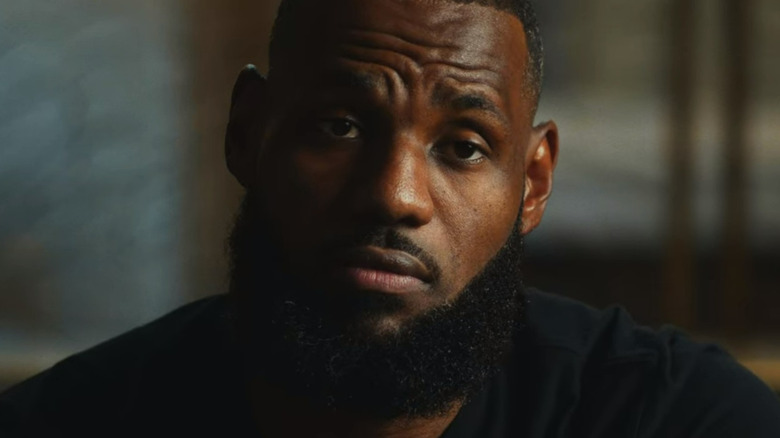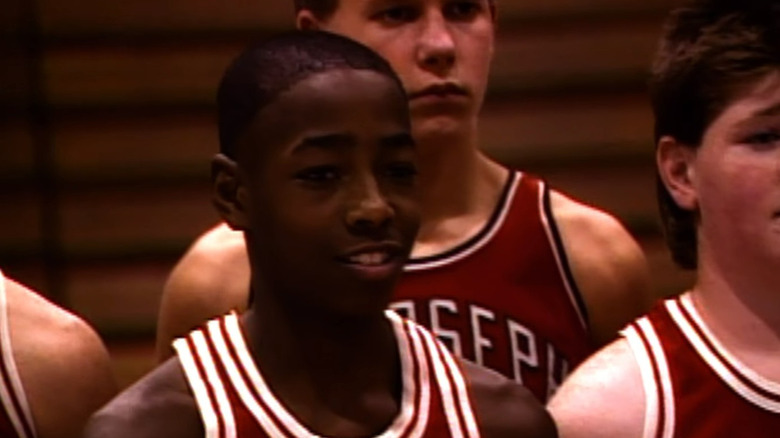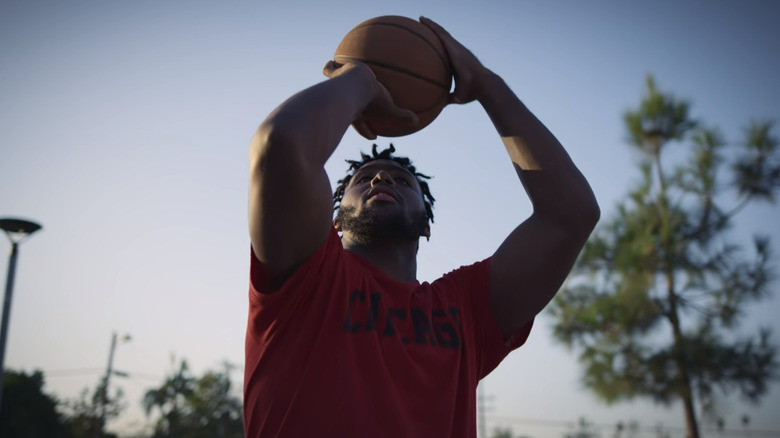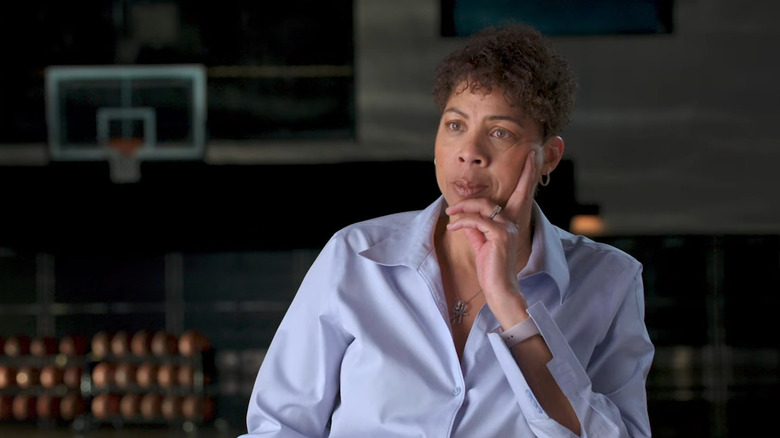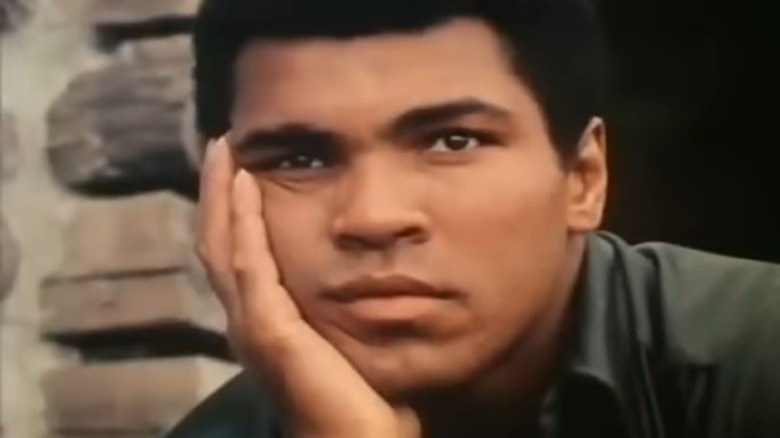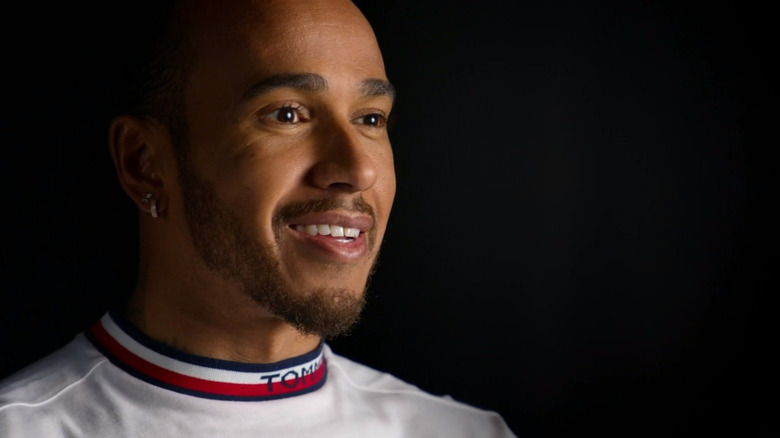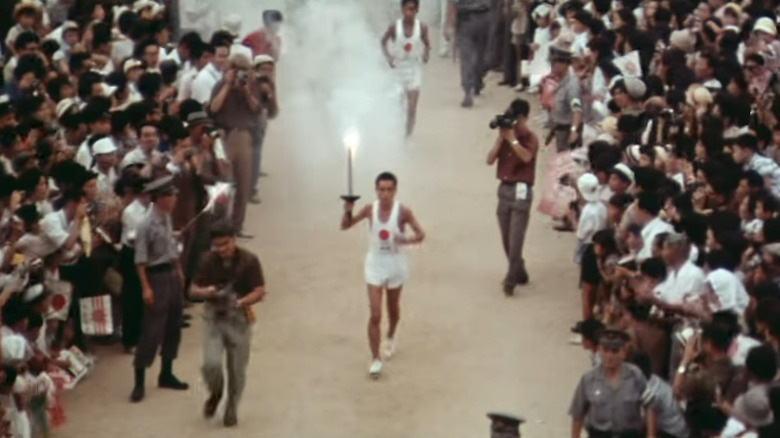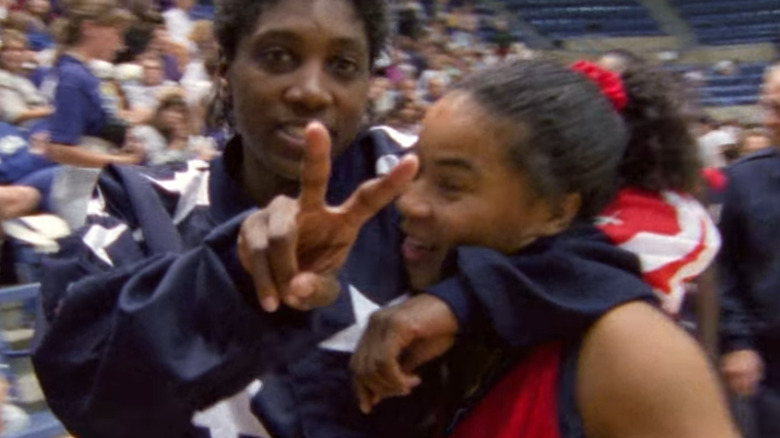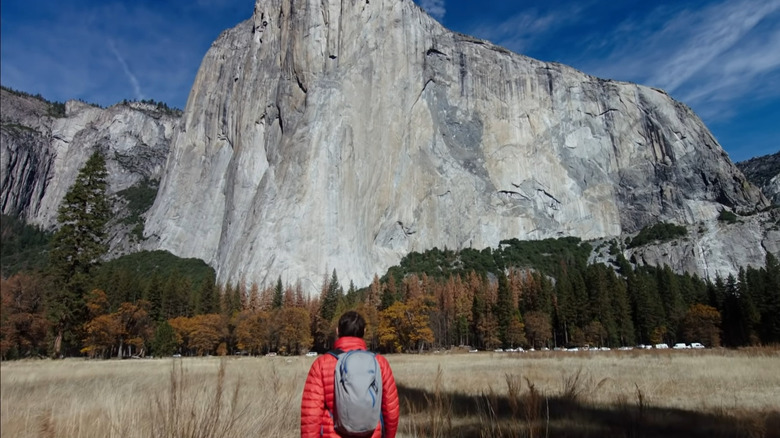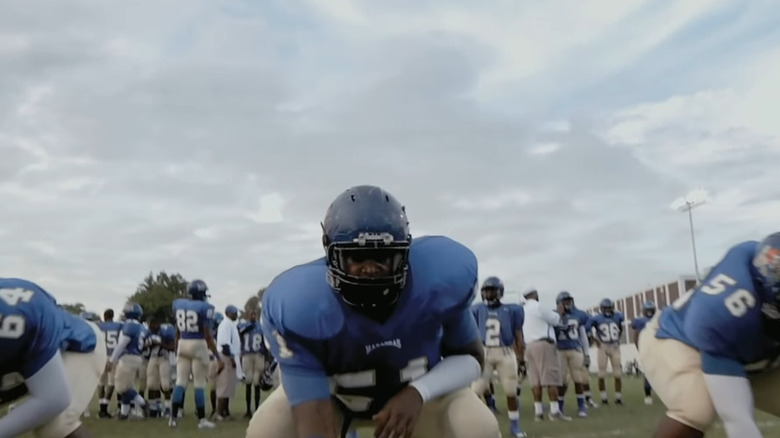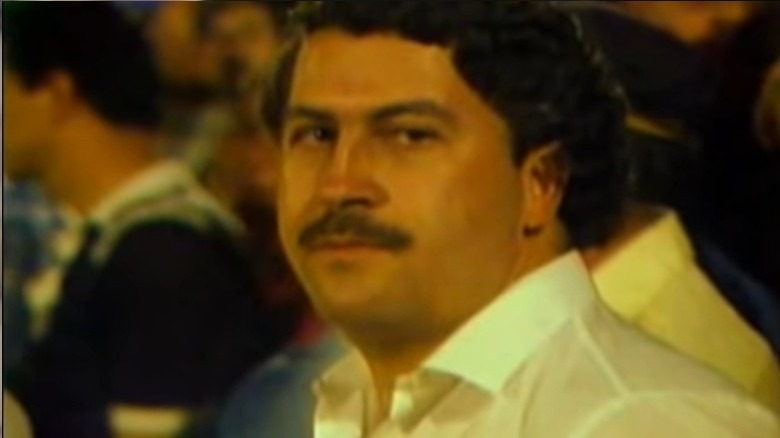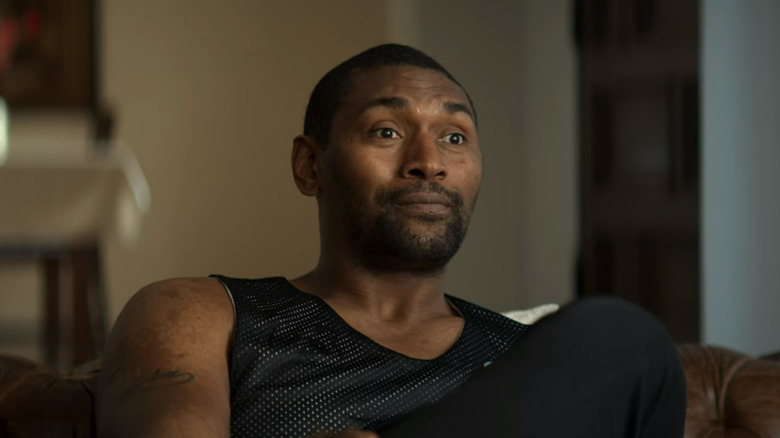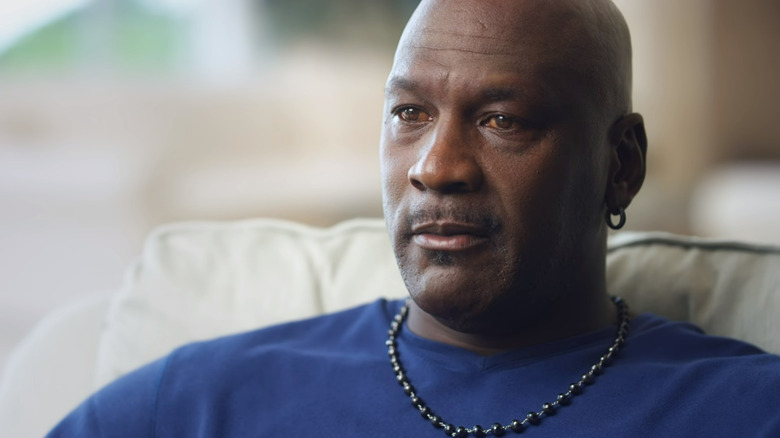12 Documentaries Like The Redeem Team You Should Check Out Next
It's hard to find a better venue for real-life stories of trial and triumph than sports. As humans, we're drawn to competition because of the emotion it naturally produces — the thrill of victory, of an underdog success, and the pain of loss. As such, it makes sense that sports have yielded some of the most memorable documentaries ever produced. Netflix has added to that legacy with "The Redeem Team," which follows the USA Men's Basketball team through the 2008 Beijing Summer Olympic Games.
After falling to the bronze medal podium at the 2004 Athens Games — a previously unthinkable fate, given America's historic dominance in basketball — it was time for redemption. "The Redeem Team" follows Kobe Bryant, LeBron James, Dwyane Wade, Carmelo Anthony, Coach Mike Krzyzewski, and the rest of the 2008 squad on their mission to bring gold back to the States. Directed by "The Last Dance" producer Jon Weinbach, the film provides a spectacular behind-the-scenes look at a major moment in the modern history of American hoops.
If you've found yourself on a basketball kick after finishing "The Redeem Team," or if it's encouraged you to check out some other real-life sports stories, you've come to the right place. Here are some other fantastic sports TV and film documentaries like "The Redeem Team" that are absolutely worth your time.
Hoop Dreams (1994)
Any talk of basketball documentaries should start with the one most would call the greatest of all time: "Hoop Dreams." The five-year saga of two kids from Chicago battling poverty and hardship by excelling on the hardwood premiered at the Sundance Film Festival to universal acclaim in 1994. It received the Audience Award for Best Documentary at the festival, and it has earned numerous accolades since, including an induction into the National Film Registry in 2005.
Set in the late 1980s/early 1990s — a period of immense growth in popularity for the NBA thanks to transcendent stars like Magic Johnson and Michael Jordan — "Dreams" tells the stories of William Gates, Arthur Agee, and their families. Gates and Agee are promising basketball players born and raised in inner-city Chicago. After being recruited to a prestigious high school team, it looks they may have the power to change their lives and those around them for the better. But of course, real life isn't as simple as fiction, and the two players' dreams face a lot of adversity.
"Hoop Dreams" isn't just a transcendent basketball documentary. It's a complicated film that blends the natural narrative of sports with a complex view of race and class in America. Many similar films have followed in its footsteps, but none have usurped the throne. Roger Ebert, who named the film the best movie of the 1990s over the likes of "Pulp Fiction" and "Goodfellas," called it "one of the great moviegoing experiences of my lifetime" in his review. Not much else needs to be said.
Last Chance U: Basketball (2021)
If you've already seen "Hoop Dreams" but are looking for something similar — a more modern tale of overcoming adversity through the lens of basketball — Netflix's "Last Chance U: Basketball" is a great watch. Like the original "Last Chance U," this series chronicles the journeys of players on a less-than-famous college team who are trying to climb the ladder from the bottom rung. The difference, of course, is that this team plays basketball, not American football.
At eight episodes, "Last Chance U: Basketball" is a lot beefier than the movies on this list. It spends its time well, though, methodically telling the stories of the players at East Los Angeles College. For one reason or another, most of those players have been pushed off the path to basketball success that once seemed theirs for the taking. Under the guidance of head coach John Mosley, the players do their best to rally around each other through the many hardships that have kept their dreams out of reach.
Emotionally affecting and exceptionally produced, "Last Chance U: Basketball" is a great watch for fans of the sport, or of documentaries in general. There's a reason it has been widely praised by both critics and viewers alike.
Women of Troy (2020)
Though it regrettably gets far less press, the history of women's basketball is as rich and thrilling as the men's game, and the HBO documentary "Women of Troy" chronicles an important part of that history. The film follows the women's basketball team at USC during the 1980s, specifically focusing on the program's back-to-back national championships in 1983 and 1984. Cheryl Miller, who won back-to-back tournament MVPs during those runs, and Cynthia Cooper, who later became one of the first superstars of the WNBA, receive particular attention.
The Trojans' dominance and flair in women's basketball was a major spark in the fire that eventually led to the creation of the WNBA and the popularization of the sport nation-wide. "Women of Troy" details the fervor that developed around the team, the way they caught the attention of fans and national media figures alike, and how the players who took the Trojans to victory defined women's basketball on all levels for decades to come.
As the WNBA rapidly grows in exposure, it's a perfect time to look back at the people who laid the foundation for the modern era of professional women's basketball. Miller and Cooper are fascinating enough to fill much more time than the film's brief hour, and they're far from the only reasons to watch.
When We Were Kings (1996)
While many folks who come to "The Redeem Team" will be basketball fans specifically, others may simply be fans of great sports stories in general. If you fall into that latter category, you'll enjoy "When We Were Kings," which centers on one of the greatest athletes of all time, Muhammad Ali.
Specifically, "When We Were Kings" chronicles Ali's fight with then-heavyweight champion George Foreman at the 1974 "Rumble in the Jungle" — a significant event for multiple reasons. The differences in persona between the two fighters, Ali's public convictions about racial inequality in America, and the military dictatorship of Zaire (now the Democratic republic of Congo) at the time, where the fight took place, are all explored. In relaying the story of the fight itself, "When We Were Kings" also explores the careers and personal histories of both Foreman and Ali, including the latter's forced retirement from boxing after his vocal denouncement of the Vietnam War.
Equally a story of one of the greatest boxing matches ever and a picture of the enrapturing Ali at a critical moment in his life, "When We Were Kings" is great viewing whether you're a fan of boxing or simply a fan of powerful stories.
Formula 1: Drive to Survive (2019)
Historically, Formula 1 has ben a pretty niche sport outside of Europe. The extensive technical aspects of races, complicated rules and team dynamics, and early-morning race times for American viewers have all contributed to the motorsport's high barrier of entry. But thanks to the wildly-popular Netflix documentary series "Formula 1: Drive to Survive,' that narrative has changed quite a bit.
After releasing its debut season in 2019, the series has become a staple of the streaming giant's documentary catalog. Most episodes follow the drivers, owners, managers, and other figures who make up the motorsport's major teams, detailing their preparation for races and the fierce competitions between entrants. Due to the expensive nature of F1 racing and the inherently dangerous aspects of the sport, there's a natural drama that emerges, which is sure to draw in even the least experienced race-watchers.
To be fair, "Drive to Survive" has also been criticized for playing up the drama a bit too much, even to the point of bending the truth from time to time. But if you go in with a discerning mind and an understanding that what you're seeing can be a bit dramatized, you'll find a series that's nearly as thrilling as being behind the wheel of an F1 car yourself.
Tokyo Olympiad (1965)
If the element you love most about "The Redeem Team" is how it peaks behind the curtain of the Olympics, then you might want to check out the definitive Summer Games film, 1965's "Tokyo Olympiad." Financed by the Japanese government and directed by acclaimed filmmaker Kon Ichikawa, the documentary is a gorgeously shot look into the world's biggest competition.
More artsy chronicle than sports narrative, "Tokyo Olympiad" might take a few scenes to suck you in. However, once you adjust to the kind of movie you're watching, you'll be enthralled until the credits roll. The film focuses less on the big storylines of the games — the winners, losers, and competitions between nations—- and more on the in-the-moment culture of the Olympic village, and the athletes therein. It's an artistic portrait of a singular moment in time, celebrating the greatness of the many competitors while also leaving room for sheer awe at the spectacle of the Olympics themselves.
There aren't any carefully plotted underdog stories or rousing locker room speeches here; that doesn't make the film any less compelling. It's as much a historical document as it is a picture of sports at their finest, and that dual nature has helped it stay just as striking and relevant so many decades later. The original theatrical cut is significantly shorter than what Ichikawa intended to release, but you can watch his unadulterated three-hour version for free on the official Olympics website.
Dream On (2022)
After watching "The Redeem Team," you might wonder if there's a similar story of redemption in the realm of USA Women's Basketball. The answer is no, because unlike the men's team, USAWB hasn't given up an Olympic gold medal since 1996.
That's not the only reason that the '96 Atlanta Summer Games are important to the history of women's hoops, however. In many ways, Team USA's absolute dominance in the competition set the precedent for players in the WNBA. Their journey to the gold medal, and to prove to the world that women's basketball had truly arrived, is expertly chronicled in the ESPN "30 for 30" documentary "Dream On."
As explored in the film, the '96 Olympics became a decisive moment for women's hoops. The WNBA had been officially created just months before the Summer Games began, turning all eyes to the players who would soon be stars of their own league. Led by hall-of-famers like Lisa Leslie, Sheryl Swoopes, Dawn Staley, and Rebecca Lobo, the women's national team proved beyond a shadow of a doubt that they wielded the skill, charisma, passion, and talent to justify their new stage, marking the beginning of a new era for the game. As fans of the "30 for 30" series should expect, "Dream On" is exceptionally produced, and a perfect way to take in the story of the '96 women's team all over again.
Free Solo (2018)
Some sports documentaries are about teams triumphing over hardship, or players bouncing back from debilitating injuries. Others are about the larger culture surrounding their respective sports — the national or even international impact of competition performed at the highest level. "Free Solo" is none of those things, and yet it's one of the most captivating documentaries you'll ever watch. Put in its simplest terms, it's a story about one man's quest to climb a rock in a way no one has ever done before.
The film follows professional climber Alex Honnold, who sets himself the seemingly impossible task of free soloing (climbing without help or equipment) Yosemite National Park's famous granite formation El Capitan. Everything from his extensive preparation and injury history to his personal relationships and upbringing are covered in the documentary's 100 minutes, all leading up to the breathtaking climb itself.
As no one had ever successfully free soloed El Cap prior to Honnold's attempt, the film deals with perhaps the most visceral aspect of sport — the quest to accomplish the unprecedented. The result is a tense, intimate look into the life of an extreme athlete, the things that drive him, and his methods for success. You don't need to be a rock climber to enjoy this one — you just need to love a great story.
Undefeated (2011)
Many documentaries have been filmed on the subject of American football, but of the bunch, there is perhaps none more famed or ubiquitous than "Undefeated." The 2011 film follows the team at Tennessee's Manassas High School, led by coach Bill Courtney, as they deal with various on-and-off-field struggles in pursuit of a winning season.
Every trope and cliché you've heard in fictionalized football movies is here: The inspiring locker room talks, the last-minute tragedies, the downfalls and triumphs, and the endless platitudes about character, teamwork, and greatness. The difference, of course, is that it's all real here. From Courtney to his players and their families, the emotional lives of the subjects of "Undefeated" are powerfully vivid. Even those less familiar with football will likely find kinship in the painfully human circumstances relayed in the film. It's just hard not to cheer when you see the Tigers win.
Acclaimed upon its release, "Undefeated" went on to earn another victory at the 2012 Academy Awards, where it was named best documentary. That makes it not only a great sports documentary, but an important piece of cinematic history as well. If you're a fan of the form, or just a fan of the sport, you'll find a lot to love.
The Two Escobars (2010)
It's no secret that ESPN's "30 for 30" series has been delivering some of the best sports documentaries around for years. One of the best entries in the series to date is 2010's "The Two Escobars," which parallels Colombian football star Andrés Escobar and infamous drug kingpin Pablo Escobar against the backdrop of the 1994 World Cup.
Part inspiring sports documentary and part true crime investigation, the film paints a richly complex, frequently dark picture of the business of sports. The documentary team does its fair share of narrative-weaving between Colombia's national team — led by Andrés — and the country's violent underworld — led by Pablo. However, the connections aren't just thematic. "The Two Escobars" also digs deep into the tangible ties between Colombia's drug trade and its public-facing persona as an up-and-comer in the world of international soccer. It's a story about how the people in power are always pulling strings behind the scenes, and about the unscrupulous ways so many of those people attain that power.
Far from the simple and uplifting approach of "The Redeem Team," "The Two Escobars" is simply sports documentary at its finest. It might not be the right pick if fun highlight reals and underdog victories are all you're looking for, but if you find yourself in search of a more complicated and intellectual bit of sports journalism, it's hard not to recommend.
Untold: Malice at the Palace (2021)
Professional basketball can be full of shining moments, several of which are detailed beautifully in "The Redeem Team." But it would be a lie to say the NBA doesn't also have its fair share of unsavory ones as well. One of the most infamous was the so-called "Malice at the Palace" — a brawl involving players and fans at a 2004 game between the Detroit Pistons and the Indiana Pacers.
If you're a fan of the NBA, you're almost certainly familiar with the incident, but you may not know all the details. That's where Netflix's "Untold: Malice at the Palace" comes in. Featuring interviews and extensive footage from the players, fans, coaches, and referees involved, the film carefully documents the many factors that combined to cause the most notorious fight in basketball history. As you might expect from a brawl that saw nine players suspended and several fans banned for life, there's a lot to unpack, and the Netflix documentary does a great job of digging into the lead-up, the in-the-moment decisions, and the fascinating aftermath of it all.
The Last Dance (2020)
If you loved "The Redeem Team," there's a good chance you've already seen "The Last Dance" — the 10-hour series documenting Michael Jordan's final ride with the 1990s Chicago Bulls. If you haven't, and you love basketball, get on it. It may not be the most hard-hitting sports documentary out there, but it just might be the most entertaining, and it paints a fascinating portrait of one of the greatest athletes of all time.
Everything you might want to know about Jordan is covered in the series, either through the original, revealing interview clips or the extensive behind-the-scenes footage from the Bulls' 1997-98 run. His insatiable competitiveness, his frequent ruthlessness, his sharp business acumen, and his addiction to winning are all explored in detail. And of course, you also get to enjoy an extended highlight reel of the man's most important and flamboyant plays, which themselves comprise enough screen time to make up their own feature-length documentary.
"The Last Dance" won the Primetime Emmy for outstanding documentary or nonfiction series in 2020, and for good reason. The interview with Jordan alone — a man known for shying away from the media since his retirement — are enough to hold your interest through the 10 episodes. That's without even mentioning all the game footage, historical exploration, and other fascinating interviewees. Though it's still the new kid on the block, "The Last Dance" has already established itself as one of the defining basketball documentaries of all time — a position it seems likely to hold for years to come.
